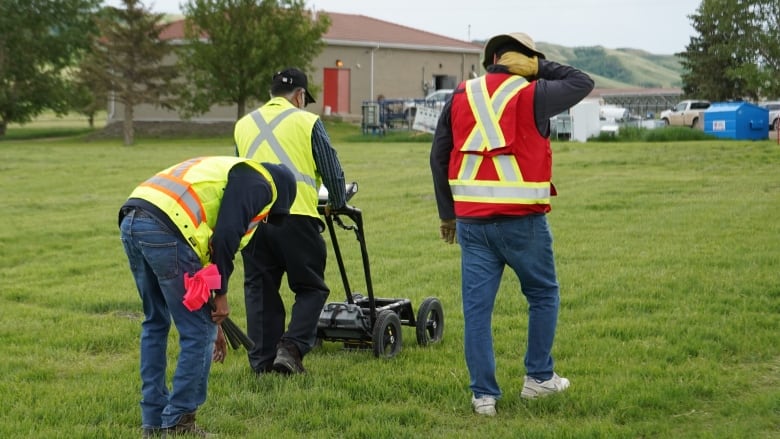Residential school survivor says grave detection technology to be used in La Ronge
Lac La Ronge Indian Band set to use ground penetrating radar at residential school over the summer

WARNING: This story contains details that could be distressing.
Waves of sadness and outrage continue to permeate Saskatchewan, as well as the rest of the country, as people grapple with the news of hundreds of unmarked graves found at residential schools.
Those grieving and ready to take action in their own community include residents in the northern tri-communities of La Ronge, the Lac La Ronge Indian Band and the Village of Air Ronge.
On Thursday, the Cowessess First Nation announced the preliminary discovery of 751 unmarked graves at the formerMarieval Indian Residential School. The announcement caused shock and outrage across the country.
The finding comes after another discovery at the Tk'emlps te Secwpemc First Nation in B.C. which announcedit found a burial site adjacent to the former Kamloops Indian Residential School. Preliminary findings indicated the site contains the remains of an estimated 215 children.
The Kamloops finding added urgency and fire to the calls for more radar detection to be done at other residential schools across the country.
La Ronge resident and survivorTom Robertsspent seven yearsin Prince Albert's residential school.He was involved in offering counselling support to residential school survivors during the Truth and Reconciliationcommission hearings. Thursday's news about the 751 unmarked graves strongly affected him.
"I'm saddened, hurt, angry. What happened many years ago should never, ever have happened. But I'm not surprised. We've heard stories ... eldershave talked about this," Roberts said.
Now, Roberts says the Lac La Ronge Indian Bandwill use ground penetrating radar over the summer to thoroughly detect any other unmarked graves.
"[What] hurts me the most ... my mind goes back to the parents. When they waited for their children to come homeafter 10 months in the residential school and they don't come out of the plane, they don'tcome out of the bus. Where's my child?" Roberts said.
"To this day, alot of these parents don't know how their child died. These parents don't know where their child is buried. And they lived with that throughout theirlifetime. And to have these things come up now, it's going to hurt, but that hurt will turn into healing."
Roberts and other Indigenous members of the La Ronge community have already done some work to uncover unmarked graves in the area.The reserve in La Ronge was once the site of Lac La Ronge All Saints Indian Residential School, which operated from 1907 to 1947.
Furthermore, Lac La Ronge Indian Band Chief Tammy Cook-Searsonand her community believethe Timber Bay Children's Home should have been registered as residential school.

In 2017, theSaskatchewan Court of Appeal ruledthat while Timber Bay housed students who attended schools elsewhere, it wasn't directly government-run and was not eligible for residential school status.
Cook-Searson arguedthe federal government was responsible for the children in the school, which was founded by the Northern Canada Evangelical Mission and operated from 1952 to 1994.
Because of this, Roberts refers to there being two residential schools in the area.
"There are graves in the back of a school site and an elder told me there are kids buried back here. They are unmarked. We had young girls, workers, school childrenclean that yard. And they found over 50 graves,most of them unmarked. We marked them," he said.
Roberts urges his people to spend time on the land, which he calls healing.
"A lot of my people are living in grief andin anger. And the only thing thatseems to help themisalcohol and drugs to kill the pain. Short term relief.We need counselorshere.We need healing programs here. We need to reach outto these people."
Roberts acknowledges that if someone is not ready to start the healing process, they cannot be made to. He says that uncovering unmarked graves will be hard on so many, but it is important to the process of healing and reconciliation to know the truth about what happened at the residential schools.
"I'm not sure what's going to happen. I'm not sure how people are going to take it. We have to prepare ourselves ... We areresilient peopleand we can do this."
Supportis available for anyone affected by their experience at residential schools, and those who are triggered by these reports.
A national Indian Residential School Crisis Line has been set up to providesupportfor residential school survivorsand others affected. People can access emotional and crisis referral services by calling the 24-hour national crisis line: 1-866-925-4419.
With files from CBC Radio's Blue Sky












_(720p).jpg)


 OFFICIAL HD MUSIC VIDEO.jpg)
.jpg)



























































































